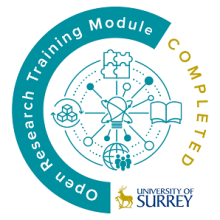
Dr Emily McDougal
Academic and research departments
Cognition, Genes and Developmental Variability Lab, School of Psychology.About
Biography
Emily completed her PhD in Developmental Psychology at Durham University (2015-2019). Her thesis investigated the role of attention in learning in autism, which utilised both quantitative and qualitative methodologies. Shortly after submitting her thesis in June 2019, Emily began her first postdoctoral position at University of Edinburgh. This project focused on the development and feasibility testing of the ‘Edinburgh Psychoeduation Intervention for Children (EPIC)’, where she worked with children with ADHD and their teachers to develop a toolbox-based intervention aimed to support cognition and learning in the classroom. Emily joined University of Surrey in May 2021 as a postdoctoral researcher on the Block Construction Skills for Mathematics (BLOCS) project, examining the link between spatial skills, Lego block construction and mathematics achievement.
My qualifications
Previous roles
Affiliations and memberships
ResearchResearch interests
I am broadly interested in cognition and educational outcomes in typical and atypical development. More specifically, I am interested in understanding how to best support primary school children who are struggling to learn at school, particularly neurodivergent children, and in using this empirical work to develop educational and clinical support strategies.
Research projects
BLOCS stands for Block Construction Skills for Mathematics. We are a group of researchers from the University of Surrey and Loughborough University working together to determine how LEGO® is related to and can be used to improve maths achievement in 7- to 9-year-olds. This research is funded by The Leverhulme Trust.
Research interests
I am broadly interested in cognition and educational outcomes in typical and atypical development. More specifically, I am interested in understanding how to best support primary school children who are struggling to learn at school, particularly neurodivergent children, and in using this empirical work to develop educational and clinical support strategies.
Research projects
BLOCS stands for Block Construction Skills for Mathematics. We are a group of researchers from the University of Surrey and Loughborough University working together to determine how LEGO® is related to and can be used to improve maths achievement in 7- to 9-year-olds. This research is funded by The Leverhulme Trust.
Publications
Children with Attention Deficit Hyperactivity Disorder (ADHD) are more at risk for academic underachievement compared to their typically developing peers. Understanding their greatest strengths and challenges at school, and how these can be supported, is vital in order to develop focused classroom interventions. Ten primary school pupils with ADHD (aged 6–11 years) and their teachers (N = 6) took part in semi-structured interviews that focused on (1) ADHD knowledge, (2) the child’s strengths and challenges at school, and (3) strategies in place to support challenges. Thematic analysis was used to analyse the interview transcripts and three key themes were identified; classroom-general versus individual-specific strategies, heterogeneity of strategies, and the role of peers. Implications relating to educational practice and future research are discussed.
Evidence suggests that cognitive and literacy difficulties are common for children with Attention-Deficit/Hyperactivity Disorder (ADHD). The current systematic review and meta-analysis investigated the relationship between cognition and literacy in children with ADHD. Ten thousand and thirty-eight articles were screened against the inclusion criteria and six eligible studies were retained for final review. Where two or more studies used comparable measures of cognition and literacy, a meta-analysis of the relationship between these measures was undertaken. A narrative synthesis of all included studies was also completed. There were medium effect sizes between working memory and aspects of reading, and small effect sizes between processing speed and reading. Inhibition and attention had differential relationships with aspects of literacy with varying effect sizes. This systematic review demonstrates differential relationships between aspects of literacy and cognition in children with ADHD. Further examination of these relationships is warranted to support intervention development.
Cognitive processes play an imperative role in children’s mathe matics learning. Difficulties in cognitive functioning are a core fea ture of Attention Deficit Hyperactivity Disorder (ADHD) in children, who also tend to show lower levels of mathematics attainment than their typically developing peers. This review (registration number: CRD42020169708) sought to aggregate findings from studies asses sing the relationship between cognition and mathematics in chil dren with a clinical ADHD diagnosis aged 4–12 years. A total of 11,799 studies published between 1992 and August 2020 were screened for eligibility using various database (PsycINFO, PubMed, SCOPUS, EMBASE, ERIC, Web of Science, and additional sources), from which four studies met inclusion criteria. A narrative synthesis was conducted on the correlations between mathematics and cog nitive domains, including an evaluation of the risk of bias within the studies. Across four studies meeting inclusion criteria, memory, inhibitory control, and processing speed were assessed. The results showed a positive association between cognition and mathematics performance in this population. The strength of associations across these studies varied as a function of the cognitive domain in ques tion, means by which mathematics performance was assessed, as well as whether confounding factors such as age and IQ were controlled for. Collectively, this review demonstrates a lack of research in this area and points to various methodological consid erations for identifying the association between cognition and mathematics performance in ADHD.
Background: Little is known about the factors impacting on learning for autistic pupils, even though academic outcomes are highly heterogeneous. The aim of the current study was to qualitatively explore factors that are perceived to impact positively (i.e. facilitators) and negatively (i.e. barriers) upon learning for primary school pupils with an Autism Spectrum Disorder diagnosis. Method: Semi-structured interviews were conducted with ten teachers currently engaged in teaching autistic pupils, which were analysed using thematic analysis. Results: Three key themes were identified: pupil’s behaviours and abilities (factors related to the child’s behaviour, cognition or personality), academic environment (physical and contextual), and teacher skills and qualities (e.g. training, trust and relationships). Conclusions: A range of factors were therefore identified by teachers, some of which corroborate with existing research, while other findings provide novel insights. Priorities for facilitating learning are discussed, as well as key areas for future investigation and potential intervention.
Background: Academic outcomes for autistic individuals are heterogeneous, but the reasons for this are unknown. Attention is known to predict learning in typical development, but there is less evidence about this relationship in Autism Spectrum Disorders (ASD), even though attention is reported as atypical in this group. Aims: To investigate reading and maths achievement profiles for children with and without an ASD, focusing on the role of attention in these profiles and to enable a better understanding of individual differences. Methods: Reading, maths and attention abilities of 22 autistic children (6−16 years) and 59 TD children (6–11 years) were measured using standardised assessments. Results: A hierarchical cluster analysis that included all children (N = 81) revealed three distinct transdiagnostic subgroups, characterised by children with good, average, and poorer divided attention and academic achievement respectively. Children with poorer attention and achievement displayed relative weaknesses in maths, while children with average or above-average attention and achievement showed no such weakness. Conclusions: The findings provide a novel insight into the relationship between attention and achievement and understanding individual differences in ASD and typical development.
